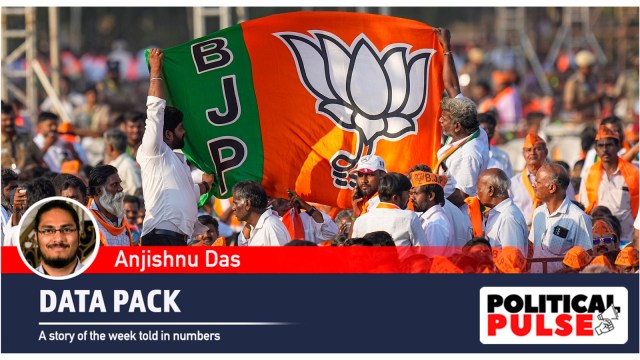New names less than half; more changes in seats BJP won in 2019 rather than lost: First list for LS polls
The 195 names include 108 sitting MPs, while 33 sitting MPs dropped, many of them are MLAs now; very few turncoats in list
 BJP supporters during Prime Minister Narendra Modi's public meeting ahead of the Lok Sabha elections, at Nandanam YMCA Ground in Chennai, Monday, March 4, 2024. (PTI Photo)
BJP supporters during Prime Minister Narendra Modi's public meeting ahead of the Lok Sabha elections, at Nandanam YMCA Ground in Chennai, Monday, March 4, 2024. (PTI Photo)With its first list of Lok Sabha candidates out, the poll season is well underway for the BJP. Of the 195 candidates announced across 18 states, 79, or less than half, are new faces compared to the BJP’s 2019 Lok Sabha list, as the confident ruling party looks to hit its ambitious target of 370 seats set by Prime Minister Narendra Modi.
The party has opted to re-field 108 sitting BJP MPs and 8 leaders who lost last time. Of the 79 new faces, only 3 are sitting MPs who recently joined the party.
The least changes have been made in states where the BJP dominates, such as Uttar Pradesh and Gujarat. The states with a major reshuffle include Assam (where the Opposition has strung together a 15-member front), Chhattisgarh (where the Congress remains strong), Delhi (where the Aam Aadmi Party and Congress have formed a coalition) and Kerala (where the BJP is trying to increase its footprint).
In all, the BJP has dropped 33 sitting MPs, including high-profile exclusions of Harsh Vardhan, Meenakshi Lekhi and Ramesh Bidhuri in Delhi, Pratima Bhowmik in Tripura, and Sadhvi Pragya Thakur in Madhya Pradesh. While Union minister Jayant Sinha asked to be relieved of direct electoral duties, several other MPs won last year’s Assembly polls to Rajasthan, Madhya Pradesh and Chhattisgarh, and have thus been replaced.
 State-wise breakdown of 195 BJP candidates
State-wise breakdown of 195 BJP candidates
Of the 79 seats with new candidates, those that the party won last time (43) outnumber those it lost (34). It is also because many of the sitting MPs are now MLAs. Two others are constituencies where the BJP did not contest in 2019.
A breakdown:
Seats BJP lost in 2019
Of the 79 seats where the BJP has fielded a new face this time, the party had lost 34 to Opposition parties in 2019. Most of these seats are in Kerala, West Bengal and Telangana (all ruled by Opposition parties).
Overall, of these 34 seats, the BJP had lost 16 to the Congress; 6 to the Trinamool Congress (TMC); 3 to the Bahujan Samaj Party (BSP); 2 each to the Samajwadi Party (SP), Bharat Rashtra Samithi (BRS) and IUML; and 1 each to the Jharkhand Mukti Morcha (JMM), CPI(M) and AIMIM.
In Kerala, for instance, the party has repeated only two candidates from the same seat as 2019, with 10 new or reshuffled names in its list. In terms of vote shares in these Kerala seats, the BJP trailed the winning party by at least 20% points in 7 seats.
The BJP’s push for Kerala is evident in its decision to field two sitting Rajya Sabha MPs and Union ministers from the state, V Muraleedharan from Attingal and Rajeev Chandrasekhar from Thiruvananthapuram. In Pathanamthitta, it has handed Anil Antony, son of former Congress Union minister A K Antony, his poll debut after he joined the BJP from the Congress last year. The BJP has fielded its only Muslim candidate in its first list from Malappuram, which the IUML won in the last two polls.
In Telangana, while the party has reposed its faith in G Kishan Reddy from Secunderabad, Bandi Sanjay Kumar from Karimnagar and one other sitting MP, 5 of the 9 candidates it has announced joined the party after 2019, including sitting Zahirabad MP B B Patil, who joined just days before the list was released. While there are 4 candidates who joined from the Bharat Rashtra Samithi (BRS), 1 joined from the Congress.
In the 6 Telangana seats where the BJP has fielded new candidates, it lost the 2019 polls by a vote share margin greater than 25% points in 5 seats. While the Congress won 3 of these seats last time, the BRS 2 and the AIMIM 1.
In West Bengal, the BJP has been gaining ground over the past three Lok Sabha polls – it won its first parliamentary seat in the state in 2009, managed to rise to 18 seats in 2019, and became the state’s primary Opposition after winning 77 seats in the 2021 Assembly polls.
While in 3 West Bengal seats where it has named new candidates, the BJP lost in 2019 by a vote share margin greater than 20% points, the contest was closer in 4 seats where it lost by less than 10% points. Of these 7 seats, the BJP lost 6 to the TMC and 1 to the Congress in 2019. Notably, in Kanthi, the party has fielded first-timer Soumendu Adhikari, son of the sitting TMC MP Sisir and brother of the Assembly Leader of Opposition Suvendu.
In Uttar Pradesh, the new names in the BJP list announced so far are in 5 seats it lost in 2019. It had lost 3 of these to the BSP and 2 to the SP. While in 3 seats, the vote share difference was less than 10% points (and as little as 0.6% in Shrawasti), in two it was over 10% points. The new faces include sitting Ambedkar Nagar MP Ritesh Pandey, who recently joined the BJP from the BSP.
Among the other seats it lost in 2019 and where it is fielding new candidates are in the Andaman and Nicobar Islands’ only seat; 2 seats in Assam, Chhattisgarh and Jharkhand each; and 1 seat in Rajasthan. The notable name among these is Geeta Koda, the sitting Singhbum MP from Jharkhand and wife of former CM Madhu Koda. Geeta recently left the Congress to join the BJP. In Assam’s Kaliabor and Rajasthan’s Nagaur, the BJP is fielding candidates after not contesting those seats in 2019.
Seats BJP won last time
In 43 seats that the party won last time, the BJP has named a new candidate. Of these, 9 seats are those where the incumbent MP contested and won in the Assembly polls held last year, including 5 from Madhya Pradesh, 3 from Chhattisgarh and 1 from Rajasthan. In Asansol, its MP Babul Supriyo quit to join the TMC in 2021. The Hazaribagh seat in Jharkhand is set to see a change with its MP Jayant Sinha bowing out.
In the remaining 32 seats, the BJP has replaced sitting MPs, despite 29 of them winning after getting more than 50% votes.
In several cases, it has named a sitting Rajya Sabha MP instead, including Union Aviation Minister Jyotiraditya Scindia, who is contesting from Guna, Union Health Minister Mansukh Mandaviya from Porbandar, Union Ports Minister and former Assam CM Sarbananda Sonowal from Dibrugarh, and former Tripura CM Biplab Deb from Tripura West.
The party has also replaced the sitting Vidisha MP with Shivraj Singh Chouhan, who was eased out as the Madhya Pradesh CM despite the BJP’s landslide win in the 2023 Assembly polls under him.
Patterns in candidate selection
Among the sitting MPs re-fielded by the party, 79 had won the previous election with more than 50% of the vote share, 28 with 40%-50%, and 1 with less than 40%. The 3 MPs who recently joined from other parties won with more than 40% of the vote share. It’s likely these MPs’ strong performances in 2019 fulfilled the party’s winnability criteria.
But this logic does not hold for 32 seats where the sitting MPs have been replaced despite winning in 2019 with more than 45% of the vote share.
In the seats the BJP lost in 2019 and the party has named new candidates, it secured more than 40% of the vote share in 11 seats, 30%-40% in 3, 20%-30% in 4, and less than 20% in 13. These seats are largely concentrated in states where the BJP has a limited presence, including Kerala, Telangana and West Bengal. There are also 10 seats across Chhattisgarh, Uttar Pradesh and West Bengal that it lost in close contests last time. The party is likely hoping a new face will give it enough of a boost to flip these seats.
Among the 8 candidates who lost last time but have been fielded again, 4 secured more than 35% of the vote share and lost in close contests in UP. The other 4 lost in West Bengal and Kerala with less than 35% of the vote share. Among them are actor-turned politician Suresh Gopi and state general secretary C Krishnakumar, two Kerala leaders who have helped the BJP increase its footprint in the state in recent polls.
Photos



- 01
- 02
- 03
- 04
- 05




























